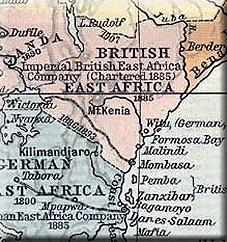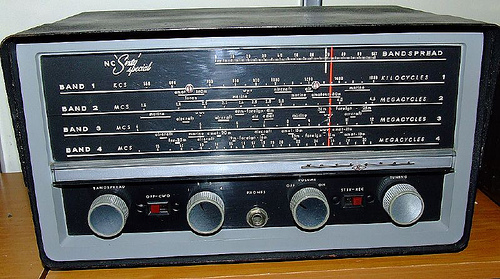The British Colonial Office during the 1930s came up with the notion that the Kenya highlands could be settled by Englishmen who were experienced farmers and adventurers. This was thought of as a sort of second try at what England meant New England (USA) to be during the 1700s.
 Well, it worked pretty well. Englishmen who felt hemmed in by their neighbors, and by the changeless class status into which all Englishmen were thrown, took the opportunity, sold out, and went to Kenya to seek their fortune. They settled in the Kenya Highlands west and north of Nairobi, the capital of Kenya.
Well, it worked pretty well. Englishmen who felt hemmed in by their neighbors, and by the changeless class status into which all Englishmen were thrown, took the opportunity, sold out, and went to Kenya to seek their fortune. They settled in the Kenya Highlands west and north of Nairobi, the capital of Kenya. They made the highlands produce all sorts of commodities, including coffee, tea, wheat, oats, vegetables, cattle crossed with local breeds, and much more. Men like Lord Delamere cashed in huge fortunes and estates in the UK and came to Kenya and developed farming and commercial business from scratch. They really must be credited with laying the foundation of commercial and agricultural life in Kenya as it is today.
Among the settlers were many rough and ready characters. They developed their own oddities, and it was almost essential socially to be just a bit strange in some way. Jim Hodson was a personal friend of my parents when they were missionaries in Kenya, and our family used to visit his farm. The Hodsons were Bible believers and a delight to be around. Jim had some amazing tales to tell of life in those early days.
One settler, living not far from the Hodson farm, had some wild pets he had tamed. His pride was his full grown pet lion, which was actually house broken and pretty much had the run of the farm. As with all settlers, this man and his wife had beautiful gardens and flower beds all around the home. The perfect climate in the Kenya Highlands made it possible to have a year round paradise with minimum care and effort.
Jim Hodson raised cattle and had a large vegetable garden, but his main commercial product was wattle bark. Wattle is from the Acacia family of trees, and its bark has medical use. In Kenya, Wattle bark was used to extract tanning acids for leather processing. Jim's wife once said that when someone called on the phone, and when Jim was out on the farm removing the bark from the trees, she did not know whether to tell the caller Jim was barking or stripping. Alas, trade talk.
Jim Hodson told us the following story about one of his neighbors.
All settlers had an African hired hand to simply keep the grounds immaculate, and a popular Kenya innovation was the "sun downer," a cocktail gathering at sun down for other neighboring settlers.
This white farmer came in from his farm one day, and walking through his flower garden and grounds, found that they had been dug up pretty badly. He was furious, and he knew just who had done it-- his pet lion. He had broken the lion of rooting up the flower beds, but he figured the lion had backslidden.
"I will teach that beggar to muck about in my gardens."
The settler, like many of his fellow farmers, carried a walking stick about with him, though he was not at all lame. It is a British thing, and if you don't understand it, you must ask them about it. I don't understand it either.
He took his walking stick and went looking for his pet Simba, lion. He found him, and he promptly gave him a good caning. The lion was hardy, and the caning did little harm, but the lion cringed, and finally the lion slunk off into the shadows humiliated.
"That will teach that rascal." The settler felt good about his being a firm disciplinarian with his pets around the farm. He then walked into his living room, and what do you think he found lying in front of the fire in his fire place?
 SIMBA !! His pet lion.
SIMBA !! His pet lion. The settler had just given a totally wild lion a good caning. He was terrified, but it was too late for that. He became quite a legend in the highlands, and his friends loved to invite him around to cane the lions on their plantation.
I suppose there is a moral in this.
If nothing else, it simply shows that man is master of the wild kingdom, BUT, only if man has no fear. That is very hard to accomplish unless man believes he is in charge.
Try it, and let me know how it works for you. We have some very wild feral hogs here in Texas that are known to be very vicious. I would like to invite you to come and visit us, and you can show me how to cane a wild hog.


